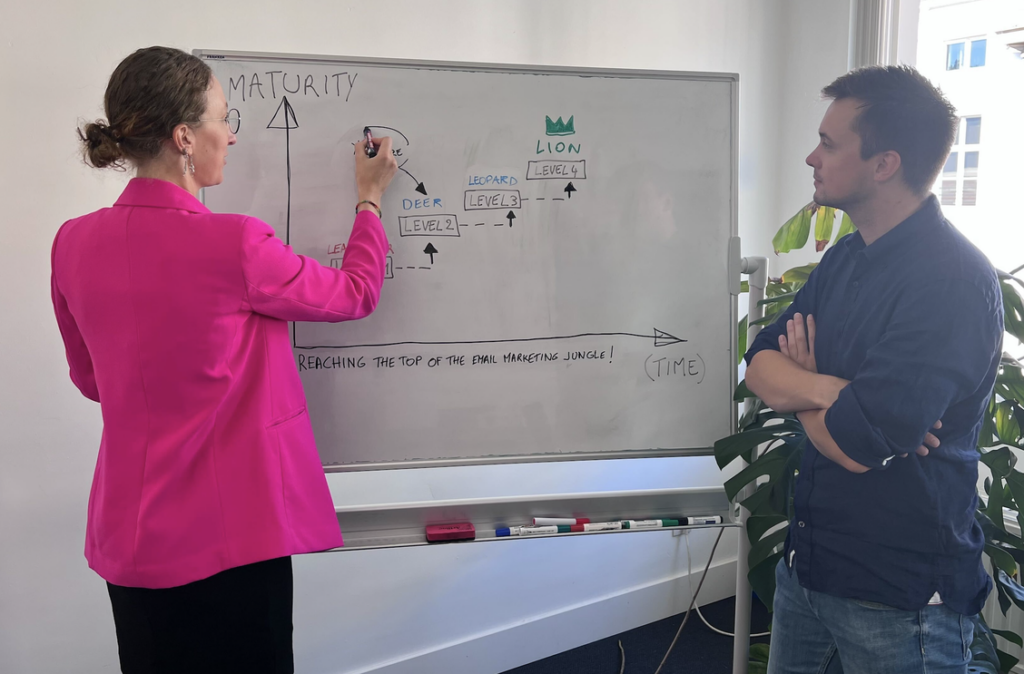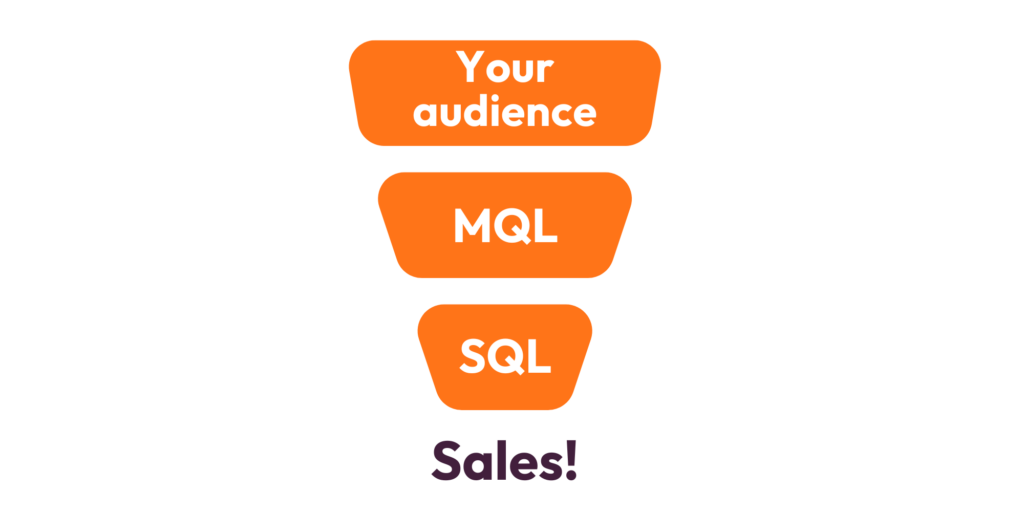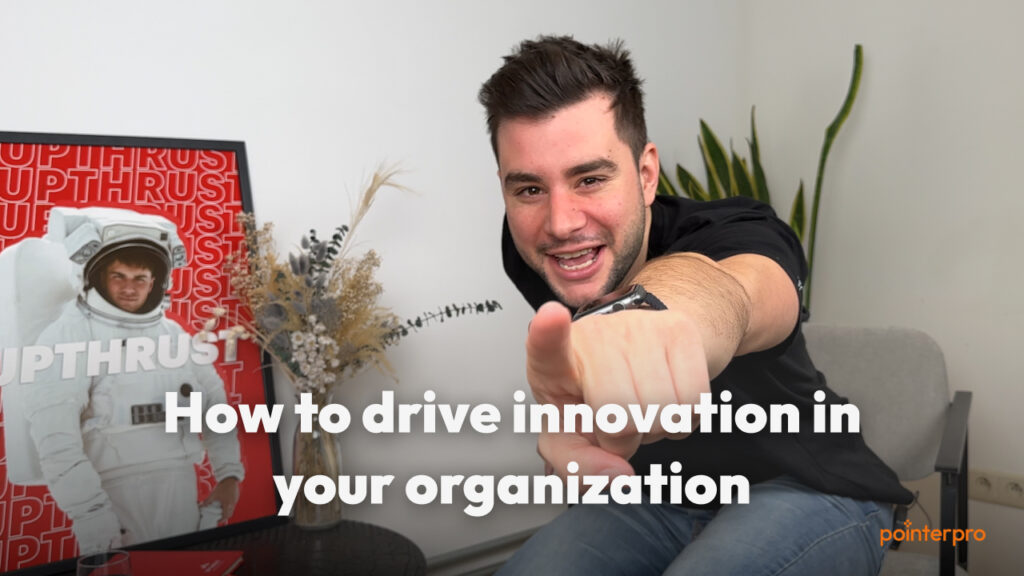In digital times, things go fast. Effective marketing means giving prospects real reason to believe in your services – in real-time.
Boot Camp Digital specializes in digital marketing services, like training and capability building. CEO Krista Neher was looking for new ways to attract her own customers, much faster. And that’s when she found Pointerpro.
In this article:

Boot Camp Digital’s insistence on skills and training is what differentiates the agency from others. Krista’s idea? Attracting new potential customers from exactly that angle.
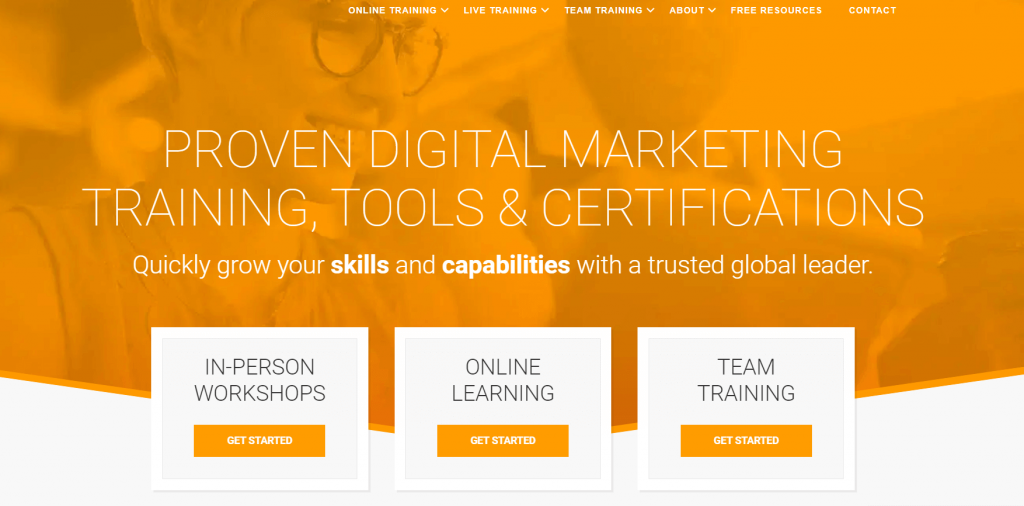
She wanted to offer marketers a digital marketing assessment to evaluate their marketing skills and give them feedback at the end of the assessment. A lead gen assessment or “lead magnet” so to speak.
But she didn’t want it to be generic. Her mind was set on creating a quiz funnel: By asking questions that measure someone’s digital IQ, she would segment her audience and offer services tailored to each participant’s level of knowledge.
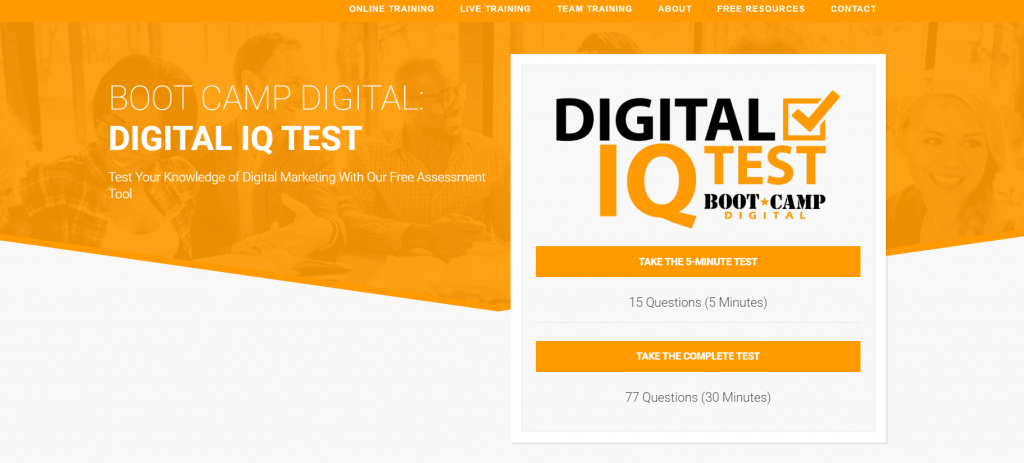
That’s when she discovered Pointerpro, still named SurveyAnypace at the time. We talked to Krista about her journey of building lead gen assessments with Pointerpro to start offering more digital savviness to marketers.
A marketing assessment as a lead magnet
We’ve been using Pointerpro for a while now. Initially, we wanted to do a marketing assessment. If you think of lead generation or marketing, the closer your content is to your core capabilities and products offering, the more likely it is to be successful.
We specialize in digital marketing training. We thought of doing a digital IQ test, because that assessment would show the need for our service since a lot of people’s skills are not as strong as they think. The assessment results naturally lead them to decide to do some training with us.
It’s a really strong integration between lead generation and our solution. So we started off with the idea of doing a marketing assessment. People can gauge their skills.
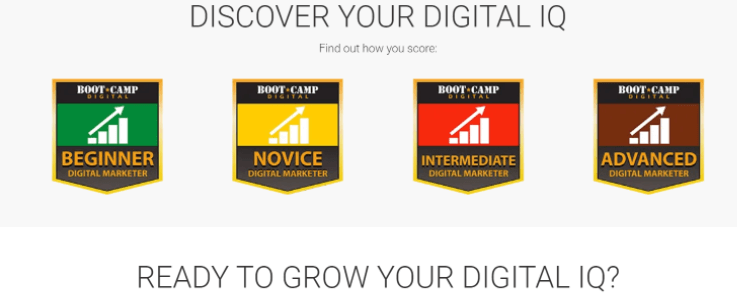
Why Pointerpro as a lead gen assessment tool?
To create our marketing assessment, we decided to work with Pointerpro because of 3 elements:
- The assessment capabilities
- The ability to have segmented results
- The connection of Pointerpro with our CRM
If you score poorly, you get a certain set of emails recommending different products. For example, if you scored well, you would get different emails recommending different products than when you scored poorly. That also has been able to grow our conversion rates.
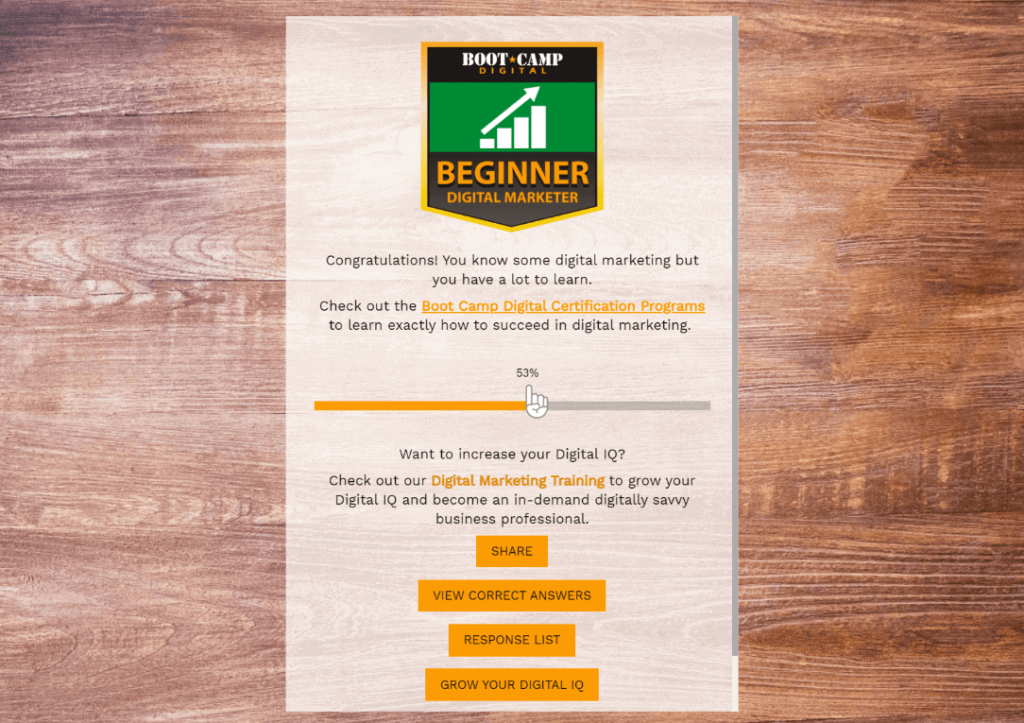
For this kind of assessment, Pointerpro was the best fit, because it allowed us to build a marketing assessment where people could see their score and results. Especially the CRM tie-in was absolutely vital.
Find out more about creating lead gen assessments or quizzes yourself here.
Want to build your own marketing assessment?
Traffic to the digital IQ test
We only use organic tools. We’ve never run any ads specifically focussed on the digital IQ test. We segment our organic results by type so that we can look at lead traffic versus product promotions, versus content.
The IQ test is consistently one of our top performers. We were able to get a lot of organic traffic to the test.
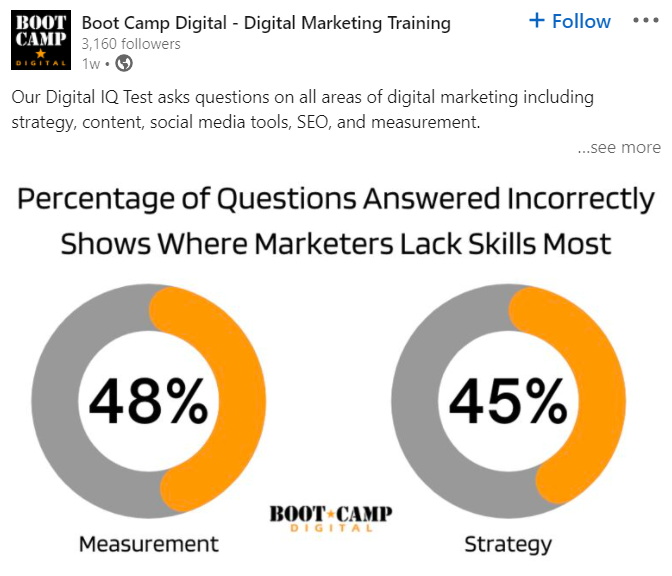
Organic SEO
What we found over time was that the digital marketing quiz ranks really well in organic SEO. When we were recently analyzing the keyword phrases bringing the most traffic to our side, ‘digital IQ assessment’ is one of our top terms bringing organic traffic, which we had never really set out to do. This is nice, because someone looking for a digital marketing quiz is coming to our site.

Our Digital Marketing Quiz ranks really well in terms of organic SEO
What we also found, especially with corporate customers, is that a lot of them want to assess their organization first. So they are not really looking for a lead gen IQ test, but they’re looking for this kind of marketing test for their organization. That’s also bringing us really good corporate leads. They find us through this marketing assessment, and that leads to a corporate sale, even if they didn’t bother to complete that digital IQ test at all.
Conversion: A lead gen assessment with results
We’ve been running the campaign for years now, and we’ve had thousands of people completing it. This campaign is the highest converting lead magnet that we’ve ever done, by far.
To gate or not to gate
What’s interesting about how we chose to execute – I know there’s a lot of opinions on this – but we don’t gate the results and require an email address in exchange for the results.
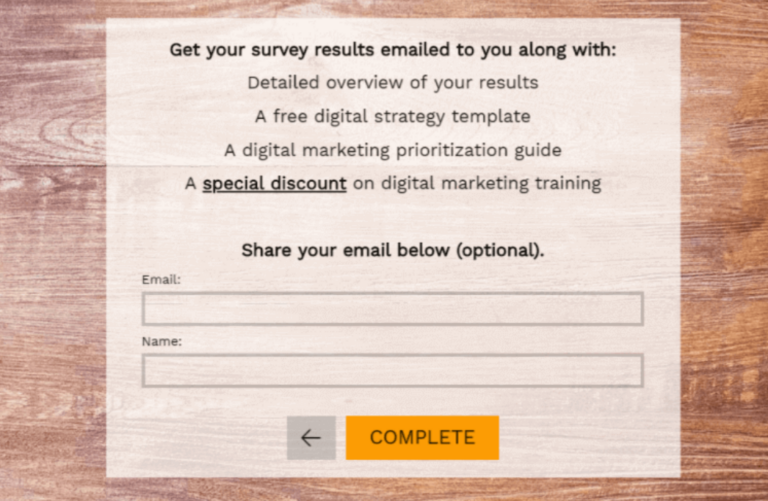
If someone completes the quiz, I’m not going to hold their results hostage when they don’t want to give me an email address. I know there’s a lot of different opinions on that. But we still have over a 50% email insertion rate. And when we ask for the email address, we promise special pricing on our trainings. That incentive seems to work.
So from a results point of view, it’s easily our most effective lead-generation tool. We have all sorts of white papers, webinars and other info products. And it’s our highest-converting email campaign.
The role of Pointerpro
The surveys are so intuitive and easy to use. It’s really easy for the customers as well. The main features that we like are the scoring and the segmentation.
Long and short digital marketing quiz
We actually have a short and a long IQ test. So the short one is 15 questions, the long one is like 77 questions. It’s super long.
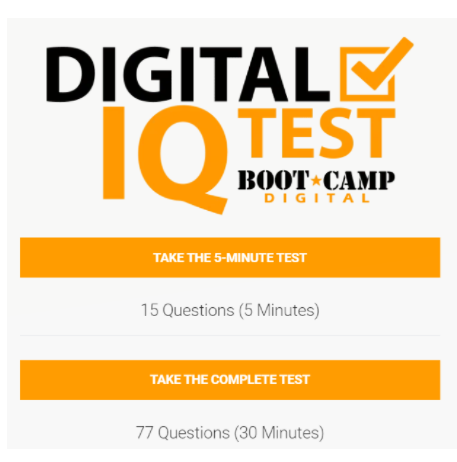
What we were able to do is segment the results by topic. So that we can say: ‘You scored really well on strategy, but your tactical knowledge on SEO is below average.’
We can actually do a lot of complex things. And that was definitely a benefit.
How to build automated assessment reports with Pointerpro
Here’s a quick introduction on how Pointerpro works, brought to you by one of our product Experts, Chris.
This is what clients say about us:



5 more ways to integrate the marketing assessment in agency operations
1. Connecting with CRM
One of the vital things was integration with our CRM. It allows us to track the scores of our respondents, so that we can save them in our records.
It also enables us to send different campaigns, based on how they scored. We can then target the products and the messaging, based on the knowledge gaps that we identified in the quiz results.
The other advantage is that people can get their results by email. We saw that they really like the ability to see where they missed and what we considered the right answer to be, and getting that through an email at the end.
Those were the features that I think have made it successful from a user experience (UX) standpoint.
2. Turning assessment results into industry research
We had the quiz campaign running for lead generation for years. We have thousands of responses and so we said ‘Look, why not turn this into industry research?’
Because, as I look at industry research that gets published in trade publications etc. a lot of the time it’s a sample of about a hundred people. And we have thousands of people that have taken the marketing assessment! So we have a lot of knowledge and insights about where marketer’s skill gaps are and how people score overall.
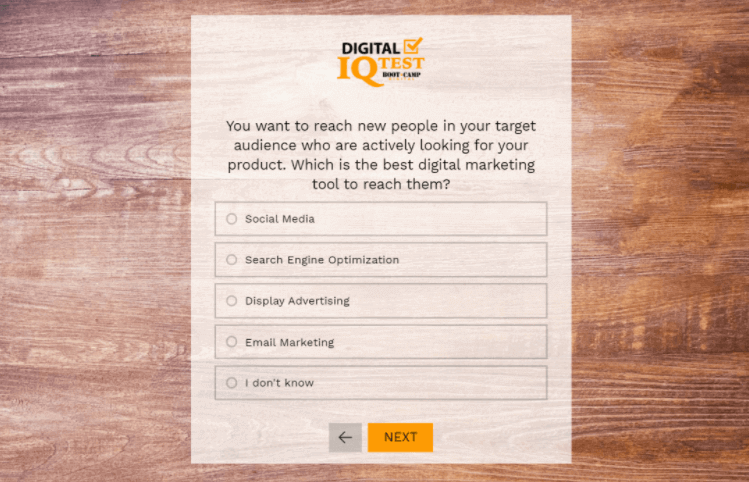
I’ve been educating in social media for a really long time. The questions are fair for digital marketing questions. We didn’t choose super easy questions, we didn’t choose super hard ones, either. We chose kind of middle-of-the-road questions that somebody who’s making digital decisions should understand. Even if they’re not executing.
We found an average score of only 36%. This is where it all really comes together:

The marketing assessment shows the gap that our product fixes
3. Developing a white paper
We created a white paper that includes all the data around the knowledge gap. It’s all really well focussed around the problem we solve as a business.
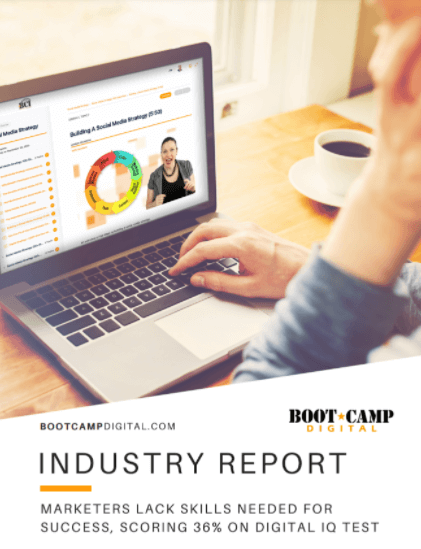
We didn’t have a huge investment behind this. This was all done in-house. The design was just done by someone in my team using Canva.
We start with some initial data, followed by more specific results: What topics they responded incorrectly to, the overall average score, whether they do better on strategy versus tactics, measurement versus strategy…
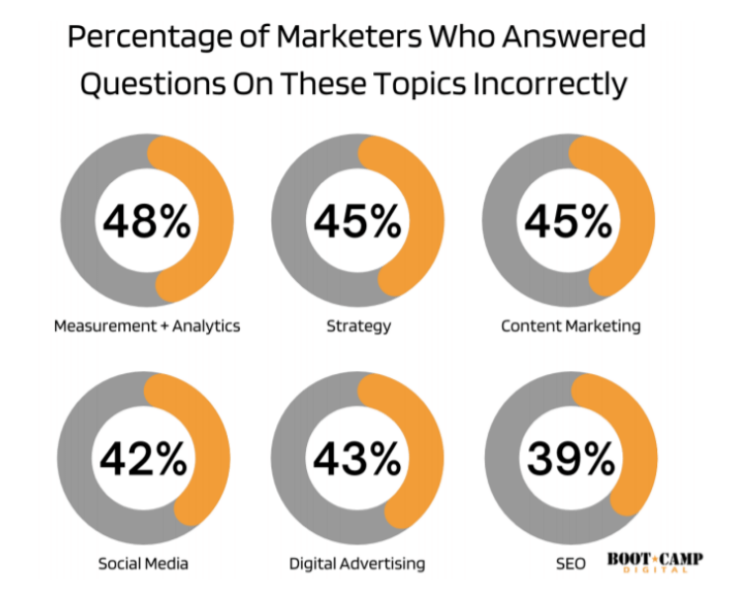
4. Creating an informative landing page
There is a really comprehensive analysis that goes on and on, based on all of the different data points extracted from the assessment results.
That gave us the idea to create a landing page on our site with all of the charts, so that they can be syndicated and linked to in articles around marketing.
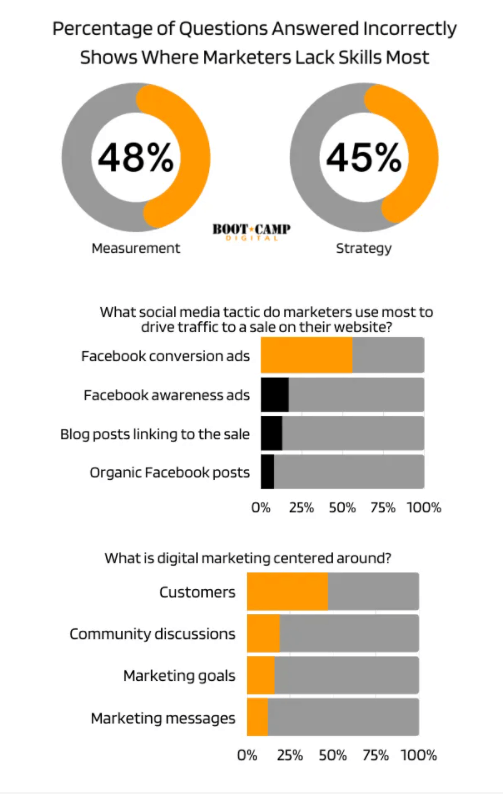
5. Gated industry report download
The full report is also available as a gated download.
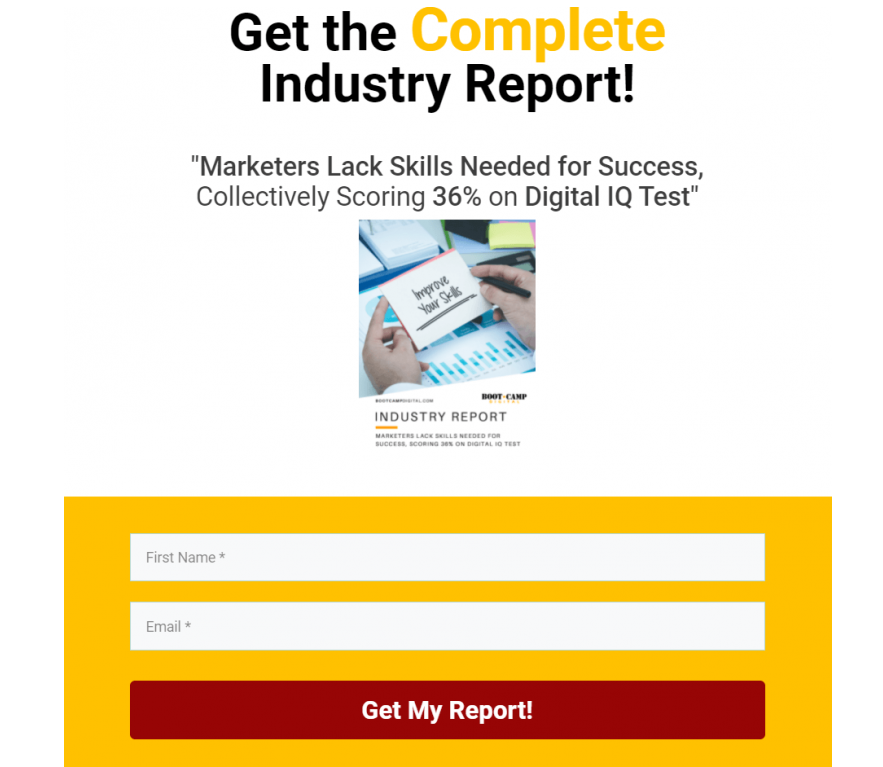
A few interesting things have happened as a result of offering this report:
- We actually didn’t do any additional research. We just used insights from the assessment we initially used as a lead magnet. And then we realized ‘Oh, we actually have thousands of responses here, which is a bigger sample size than most industry research anyway. So why don’t we publish our results?’
- Because the score is so low, everyone is curious if they could do better. So we’ve seen a huge increase in the IQ test by promoting the bad scores, which was not exactly our intention but it is definitely interesting
- We also used it as a PR outreach and link-building tool. We don’t have a link builder or a PR person in our company, but we’ve been able to attract significant backlinks.
-
We also optimized and posted our images in places so they’ll show up when people are searching for stats and things like that. And hopefully become part of other narratives around marketing skills.
We don’t have a link builder or a PR person in our company, but we’ve been able to attract significant

We don’t have a link builder or a PR person in our company, but we’ve been able to attract significant backlinks.
The goal is that over time, we’ll try to keep the research a little more evergreen than most research because this type of data doesn’t really exist in a lot of places.
As you can see, we are using it in a bunch of different ways: We have a download. We’re getting leads from the white paper. We also use this as a tool in our email campaigns.
The digital marketing quiz is driving more people to take the IQ test. Plus we’re getting PR, link-building and SEO results from sharing the data we gather. And all of that from a report, from something we already did to actually just get leads.
We’re using the tool in a bunch of different ways, but it’s all building the same narrative: “Guess what, everybody needs training.”
We are sitting on this data pile, we had to do something with it. From an SEO standpoint, it takes some time to really see the growth in your business. But all of the indicators are good and we’re getting traction from our campaign.
We’ve been able to really drive growth overall for the business.
Improving the marketing assessment with demographic questions
As you just read, Krista and her team discovered more and more advantages to using the quiz and gathering the data. It’s a circle of data collection that goes round and round infinitely.
In that respect, they saw an opportunity to add extra sections and questions to the quiz. First of all, they added recommendations inside the quiz when someone had a wrong answer.
As far as content creation goes, they still felt a bit limited from a headline standpoint. They started looking for new and engaging narratives. Krista explains:
We already have some nice narratives, but we felt limited. So we went back to the IQ test and at the end we threw in some optional demographic questions to give ourselves more narratives, talking points and charts.
So, now we’ll just let it run for another year. Then, in next year’s version, we can say for example: ‘People over 40 score better than people under 40’. And that’s a totally new headline that we can go with.
Krista’s tips to create successful lead gen assessments
Tip 1: Use assessments to prove your expertise
From a strategic standpoint, really think about what kind of an assessment links to the problem that you solve for your customers. If you’re looking to use assessments for lead generation, the closer the assessment is to our value proposition, the better it does at converting customers.
It should show the knowledge gap that exists and that our products solve.
Tip 2: Make your assessment light and easy
We have a huge database of questions from our online training courses. So it didn’t take us a lot of time to come up with 50 questions. We pulled them from what we teach people.
From a practical standpoint, in terms of successful implementation, the key is to make your marketing assessment light, fun and easy. Our assessment that has the most responses is only 10 to 15 questions.
Tip 3: Make your assessment relevant
We tell people that if they want more, they can do the long version, mentioning that it takes almost an hour. But we still have thousands of people who’ve filled out the long marketing assessment, too! So you might be surprised what people are willing or interested to do, if it’s relevant for them.
Tip 4: Connect the assessment to your CRM system
The real key to our success from a business standpoint was connecting it to our CRM. If that piece had been missing, we’d still have got lots of leads but they wouldn’t have converted that well.
Because of the CRM connection, we have a very specific email chain of customized emails that they get based on passing or failing the assessment.
Tip 5: Don’t require an email address
Another key to success is that we don’t require an email address. That’s also my personal marketing philosophy: to be less annoying. I know more annoying often converts better but it’s just not how I want to grow my business.
We do give an incentive and then we have very specific campaigns through our CRM. That way we’re able to make the most out of our leads.
Those would be both the high level and tactical keys to success that we’ve seen from doing this marketing assessment.
Conclusion: Why Bootcamp Digital’s marketing assessment converts so well

We were pretty impressed with the idea of doing a marketing assessment and how it turned out
It’s because of the closeness to the problem our customers have. I think a lot of people miss that approach. That’s why I think this works so well on converting website visitors. The marketing assessment is so specifically linked to what our audience needs from us: professional training in different marketing fields.
And then you have the curiosity of what their score will be: ‘Do I not know everything that I thought I knew?’
It’s a magical combination that brings us high traffic, leads and conversion.

